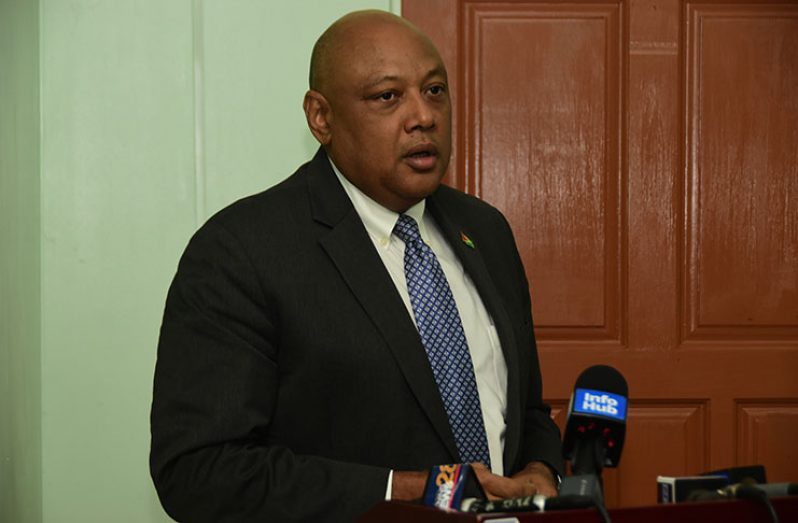— says Trotman as stakeholders discuss draft oil spill plan
GUYANA can operate as both an oil producer and as a ‘green’ economy, provided its National Oil Spill Contingency Plan (NOSCP) is fully developed, says Minister of Natural Resources, Raphael Trotman.
He made these remarks during a stakeholders’ consultation on the NOSCP held at the Civil Defence Commission (CDC), Thomas Lands, Georgetown on Wednesday.
The meeting was convened in order to deliberate, evaluate, and modify, if necessary, the main components of the draft framework of the plan which must be implemented for the protection of Guyana’s maritime area.
Presenting an overview of the draft, Director of Maritime Safety at the Maritime Administration Department (MARAD), Captain John Flores said the plan takes on a consolidated approach of both planning and prevention.
Flores took the time to explain the various ways in which oil spills can cause harm to the flora and fauna of countries, while providing evidence which showed that even after clean up measures, the destruction of oil spills can still remain.
These are evident in sand and tiny particles which collect oil and stick together and can come into contact with beaches and sea creatures several years after the initial oil spill.
As such, the Government of Guyana has both national and international obligations to develop a contingency plan even as it awaits the development of its petroleum sector, which will not come without its risks.
The draft stipulates that there should be a national authority responsible for the coordination of responses; a national focal point through which reports are received and disseminated and national response agencies.
In addition, a National Oil Spill Management Committee must be set up for the completion of the draft, the training of personnel and to provide advice to the Government on contingency planning.
The Maritime Safety Director, in his overview, pointed out that to date Guyana only has one piece of legislation–the Environmental Protection Act–which guards against the harming of the environment.
Speaking on behalf of Minister of State, Joseph Harmon, Minister of Natural Resources, Raphael Trotman congratulated Captain Flores and the staff at the CDC for their efforts to formulate the draft.
He indicated that the issue of oil spills is a common topic which justifies that no effort should be spared in preparation for and prevention of the unfortunate occurrence.
PRECAUTIONARY MEASURES
Trotman added that while the standards of oil industries are very high due to past dire experiences, the government will still take precautionary measures to guarantee the safety of its environment.
“We expect that in 24 months when we got to production in the first quarter of 2020, we will meet not only the minimum standards expected, but we will go past that and dare to say to ourselves and particularly to the world, that we are ready for any eventuality,” Trotman said.
The minister was keen to note that some individuals question how it is that the government can embark on a ‘green’ economy initiative while emerging as an oil producing nation.
However, in response to these concerns, he pointed to counties such as Norway, which have successfully managed both the protection of their environment and the production of oil.
“Norway has branded itself as one of the best places for the preservation, protection and respect of the environment and the world and yet Norway is one of the world’s top producers of petroleum,” the minister said.
He added: “I believe as Guyanese, we have grown accustomed to being cynical, to be doubting… we have good men and women in this country who can do, who have been doing and who will continue to do, and we’ve got to stop doubting ourselves [thinking] that we’re incapable. Lesser countries than ours have done this and we are going to do it as well. ”
Trotman recognised the presence of Environmental Activist, Annette Arjoon and highlighted her efforts in advocating for the creation of a NOSCP plan which will help to protect marine life.
The draft under discussion also includes plans for the creation of sensitivity maps which will highlight the most vulnerable areas in Guyana, such as Shell Beach which is located in Region One.
The natural resource minister said the importance of developing a national oil spill plan continues to grow as the country gears up towards developing all of its remaining oil wells.
He indicated that the government intends to collaborate with countries such as Trinidad and Tobago, the United States (US) Coast Guard and the International Maritime Organisation (IMO) to facilitate training.
“We are not operating in isolation, we are working as a member of an international body of nations, each with its own unique circumstances and facts, but at the same time there is commonality and we are getting help and assistance,” Trotman said.
The draft, when completed, will be reviewed by the Cabinet following the vetting of other experts as well as public and national consultations to ascertain it meets international standards.
So far, IMO auditors have referred to the document as an “adequate framework” which must be built upon and exercised as the country works towards a 2020 deadline for the completion of the plan.



.jpg)








